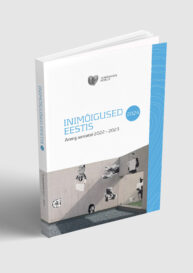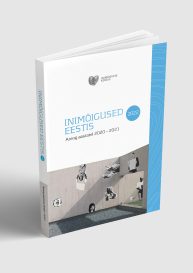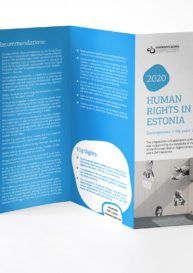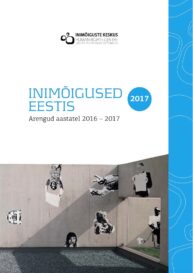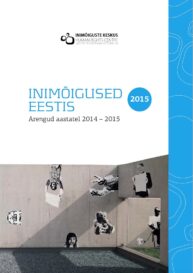The report “Human Rights in Estonia 2010″ is available in pdf-format in English, as well as in Estonian and Russian.
The purpose of the report is to provide a general overview of events in protection of human rights in 2008 and 2009 in various domains. The authors of this research chose specific topics that were afforded greater media attention. In 2008 and 2009 those topics were post-sentence preventive detention, partnership of same-sex couples and equal treatment. Some topics were chosen by the authors with the intent of drawing attention to situations that have not enjoyed wide attention before in Estonia. Therefore, for example, the alternative service for conscription service is viewed in depth, as well as a specific case of conflicting human rights.
Freely available public information from various sources has been used upon drawing up of this report, including annual statements of state agencies, reports and opinions of non-governmental organisations and international organizations, as well as materials gathered by HRC. The sources have been analyzed independently and critically; and the report has not been submitted for approval by any of the state agencies prior to publication. A diverse material from state agencies, international organizations and non-governmental organizations has been used as source material, as well as compared analytically where possible.
Chapter 1 – Right to liberty and security
Chapter 2 – Right to fair trial
Chapter 3 – Right to respect for private and family life
Chapter 4 – Freedom of thought, conscience and religion
Chapter 5 – Freedom of assembly
Chapter 6 – Right to marry
Chapter 7 – Prohibition of discrimination
Chapter 8 – Rights of a child
Chapter 9 – Civil society
Overview of the report
2008 and 2009 brought about change in several areas connected to human rights, which were discussed in this report on various levels of specificity.
The positive developments that strengthened the protection of human rights in Estonia were:
- Considerable simplification in organising public assemblies in 2008: most public assemblies may be held upon just two hours’ oral notice. The refusal to register a meeting is no longer absolute and the emphasis has been placed on negotiations, which would bring the meeting in line with the law.
- Discussion on regulation of same-sex couples’ relationships has been initiated: The Ministry of Justice concluded an analysis on non-marital cohabitation, which looked at various methods of regulating such relationships. It was proposed in the course of discussion that a partnership act be created; however, work on preparation of a draft has not begun yet.
- A great step forward in non-discrimination area was made by the adoption of the Equal Treatment Act, even though the law was passed due to the pressure from the European Commission. It contains somewhat problematic provisions and the implementation is not effective enough, it is still a step forward, now that the principles of equal treatment are stated in detail in Estonian law. This affords victims of discrimination better legal protection than before.
- Positive changes in the domain of civil society in 2008 and 2009 came with increased financing opportunities from the Civil Society Foundation and Norway-EEA Non-governmental Organizations Fund. These measures are primarily aimed at increasing the ability of citizens’ associations to function.
There are also several ongoing shortcomings and new problem areas:
- The option of detaining repeat offenders post sentence has been created. Even though work on the problem of repeat offenders constitutes as progress in ensuring public order, the specific measures chosen potentially contradict human rights in several aspects. For example, it may contradict the practice of the European Court of Human Rights to apply post-sentence preventive detention in a situation, where specific issues of rehabilitation have not been addressed.
- In the area of administration of justice there is an ongoing problem concerning legal aid, which may not provide everyone with an equal opportunity to turn to court and be represented (especially outside larger towns). The small number of lawyers in Estonia and corporate nature of the bar mean that possible conflicts of interests should be closely supervised. Access to justice would also improve if the limitations on locus standi of third parties were not as restrictive.
- There is room for improvement in protection of human rights in Defence Forces, which has also been pointed out by the Chancellor of Justice. The problem is primarily the length of alternative service in comparison to the standard service in Defence Forces, which is also indicated by the small number of people who have opted for the alternative service. There are also other problems with alternative service: personal moral and religious beliefs must be proved and upon insufficient proof the state may refuse the option of alternative service.
- There is still no option available for same-sex couples to regulate their relationship in a manner that is equal to marriage. A new Family Law Act has been adopted, which precludes same-sex marriage and thereby contradicts general trends in the world.
- Despite the adoption of the Equal Treatment Act there is no general political will to deal with issues of non-discrimination. This is indicated by the decrease in resources allocated to the Gender Equality and Equal Treatment Commissioner.
